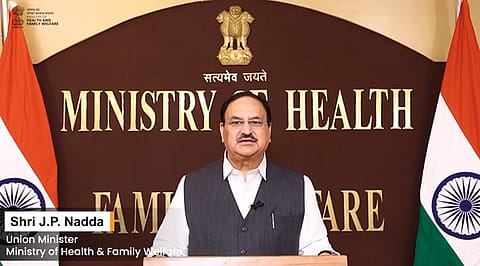MedTech sector critical for accessible, affordable healthcare and innovation: Union Health Minister JP Nadda
The medtech sector in India has become a trusted provider of high-quality healthcare, the minister averred.

Calling for collaboration to achieve the Viksit Bharat 2047 vision, JP Nadda, the Union Minister of Health and Family Welfare and Chemicals and Fertilisers, said on Tuesday that the medtech sector is critical for accessible and affordable healthcare and innovation.
Addressing the inaugural session of the 11th Asia Pacific MedTech Forum (APACMed) 2025 through a video message from New Delhi, Nadda emphasised the fact that the medtech sector is a key pillar to health transformation in India.
According to Nadda, the sector has a broad scope, encompassing diagnostics, advanced devices, digital health, and AI-driven solutions—all of which work in tandem to make healthcare more accessible, efficient, and affordable for every citizen. “The sector has become a trusted provider of high-quality healthcare, supported by the government’s focus on access, innovation, and infrastructure development,” he added.
The minister also noted that APACMed members in India have a growing footprint, achieved through the manufacturing, research, and development of complex technologies, as well as integration into global supply chains. He also highlighted that the forum’s theme and agenda are closely aligned with Prime Minister Narendra Modi’s vision for Viksit Bharat 2047, instilling optimism about the future of healthcare in India.
Nadda said that the four thematic pillars of the forum encapsulate the essence of a shared vision for a healthcare system that is innovative, inclusive, and globally competitive. He was also upbeat that the deliberations over the next two days would shape strategies, open new opportunities, and strengthen the mission of making India a global hub for medical technology.
His address was followed by Anupriya Patel, the Union Minister of State for Health and Family Welfare and Chemicals and Fertilisers, taking on the dais, who spoke on several major government initiatives undertaken to strengthen India’s MedTech and medical devices sector. The initiatives include a new scheme for supporting component manufacturing, development of common infrastructure, branding, and conducting critical market and clinical studies.
She also emphasised the government’s investor-friendly policies, including 100% FDI in medical devices, the establishment of an Export Promotion Council, and the formation of a National Medical Devices Promotion Council to improve ease of doing business and broaden export opportunities.
Recommended Stories
“India is emerging as not only a high-volume manufacturer but also a high-value player in the global MedTech market. The next leap will come from collaborations, and I invite all stakeholders to join India in co-creating solutions that will serve both our 1.4 billion citizens and the broader healthcare needs of emerging markets,” said Patel.
The APACMed is holding a two-day forum in New Delhi under the theme, “Swastha Bharat – A Healthier India, Together”. It has brought together senior policymakers, global industry leaders, regulators, and healthcare experts from more than ten countries across the Asia Pacific region to align strategies for shaping India’s MedTech roadmap in line with the Prime Minister’s Healthcare Vision 2030 and Viksit Bharat 2047.